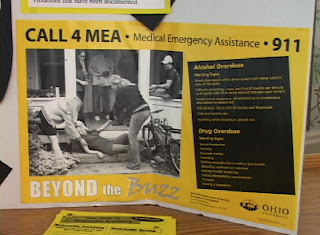by Dante Brunetto
db132505@ohio.edu
On any given weekend at Ohio University, police arrest students who use drugs and alcohol in excessive amounts. According to Sophomore Zach Ochs, it’s something that has become a part of the college lifestyle. Sometimes there are students who overdose on alcohol or drugs and find themselves in need of medical attention, but it turns out a surprising number of students would not call for help in this situation.
Char Kopchick, Director of OU Health Promotion, says OU conducted a survey of five thousand students last year and 94 percent said they would not call for help during a situation involving an alcohol or drug overdose out of fear of disciplinary action. That’s why the Health Promotion division of Student Affairs at Ohio University developed the Medical Emergency Assistance (MEA) Program. The program allows students in these situations to call for emergency services without the concern of disciplinary action.
OU Director of Health Promotion Char Kopchick explains MEA.
The Purpose of the Program
The Medical Emergency Assistance Progran has two major goals:
*Increase the likelihood that students will call for emergency medical assistance when faced with alcohol or drug-related emergencies.
*Educate students about the hazards of high-risk alcohol and other drug abuse to reduce the likelihood of future risky behavior.
This information and more can be found on the Health Promotion website: www.ohio.edu/alcohol
Troy Akins, Resident Assistant, says the program puts safety
before discipline
Taking Away the Deterrent
Following an alcohol/drug overdose incident, students who received emergency medical assistance meet with the Director of University Judiciaries where the student is admitted into the Medical Emergency Assistance program rather than facing formal university disciplinary action. Students admitted to the program are required to successfully complete the program in order to avoid the formal disciplinary action. Also, students who call for help on behalf of another student in need of medical aid will not be subject to disciplinary action either. If a student fails to successfully complete the MEA program, they may face formal disciplinary actions for the overdose incident.
Char Kopchick talks about removing the barriers to calling for help.
Completing the MEA Program
There are three elements of the MEA program that students must complete to avoid any disciplinary action:
*Comply with all recommendations for educational interventions
*Complete an alcohol/drug intervention program through Counseling and Psychological Services
*Pay a $100 fee to cover the cost of the intervention program.
For questions or comments concerning the MEA program, contact the Health Promotion department at 740-593-4742 or stop by their office in the Baker Student Center room 339.
skip to main |
skip to sidebar


Featured Links
Story Archive
-
▼
2008
(200)
-
▼
October
(38)
- VIEWS of ATHENS VOTERS: Supporting McCain
- VIEWS of ATHENS VOTERS: Supporting Obama
- REPORTER BLOG: Vote Smart
- Alexander High Schoolers Debate and Discuss the El...
- Political Sign Vandalism
- REPORTER BLOG: History 101
- DETOUR: Road Closing Proves More Difficult Than It...
- REPORTER BLOG: Lessons Learned while "Lost"
- Update: Fixing the Form or Pressing Charges
- Party Animals finding Homes
- REPORTER BLOG: Covering Politics Without Being Po...
- Another Rate Hike for Athens Residents
- REPORTER BLOG: Realizing the Resemblance during El...
- The Landlord Tenant Agreement: Signed and Forgotten?
- VIEWS of ATHENS VOTERS: Angst of an Undecided Voter
- Three Man Race For State Senate
- REPORTER BLOG: My 15 Seconds of Fame as Rufus the...
- City Council: Saving Salt and Saving Money
- How Krogering Helps Your Community
- REPORTER BLOG: No Reacting, Just Reporting
- When the Going Gets Tough, the Tough... Use Coupons?
- REPORTER BLOG: A Winning Attitude
- REPORTER BLOG: Swimming Around the World
- VP Candidate rallies in Athens
- Student Loans Tough to Come by in Financial Crisis
- REPORTER BLOG: 80% is an Incredible Chance
- REPORTER BLOG: A Few Dollars Goes A Long Way These...
- Faculty Senate Encourages Unionization
- Wall Street to Court Street: The Economic Crisis ...
- OU Program Puts Safety Before Discipline
- REPORTER BLOG: Heart of the Game--Hometown Rivalries
- Athens Receives $215K for Low Income Housing
- ARTS/West - The Gateway to Arts in Athens
- REPORTER BLOG: The Emotional Casualties of a Murd...
- REPORTER BLOG: The Game of Getting an Interview
- REPORTER BLOG: Focus, Focus, FOCUS!!!
- Preparing for a Health Crisis in Athens County
- REPORTER BLOG: Great Conversation Doesn't Require...
-
▼
October
(38)
topic(s) covered:
- athens ohio (1)
- blog (57)
- city website (1)
- news (72)
- pets (1)

No comments:
Post a Comment